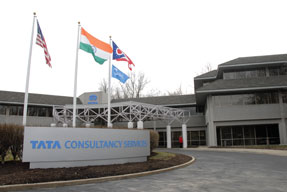Business
End Of The Outsourcing Party?

The global recession is taking a toll on the outsourcing sector.
The global recession has thrown a spanner into the unrelenting growth of the $60 billion Indian outsourcing industry, which, by some accounts, generates more than 5 percent of India’s gross domestic product and employs nearly two million people.
As job losses in the U.S. mount, opposition toward outsourcing, most notably to India, is gathering steam. In his first address to Congress in February, Pres. Barack Obama vowed to crack down on tax breaks for American companies that outsource jobs to India and elsewhere around the world. The political backlash was abetted by an untimely $1 billion accounting scandal at Satyam Computer Services. The World Bank also banned another Indian outsourcing services provider, Wipro, from bidding for its contracts for four years, accusing the Bangalore-based firm of providing “improper benefits” to bank staff. India’s BPO industry has also been buffeted by quality control issues and recently companies, such as Delta Air Lines, Chrysler and United, have curbed or halted the use of Indian call centers following customer complaints about language skills or to placate growing protectionist sentiments in the U.S. Is the outsourcing party coming to an end? Morgan Stanley projects an erosion in demand for Indian IT firms, and warns that the impact of budget cuts, mergers and bankrupt clients has not yet been fully reflected in the share prices of Indian providers. Smaller companies, especially those focused on a single market or service, are likely to be at risk in this environment. Earnings reports filed in recent weeks by the top three Indian outsourcing companies, Tata Consultancy Services, Infosys and Wipro, point to a significant slowdown. Wipro’s revenues slipped by 3% over the previous quarter and Infosys posted its first decline in quarterly revenues over the previous year and warned of weaker results ahead.
Infosys’ North American growth, which makes up 64.6 percent of revenues, declined by 4.14 percent sequentially in the fourth quarter. Ashok Vemuri, Global Head, Banking & Capital Markets Practice for Infosys, says: “The economic downturn has had an impact on two critical factors which directly affect outsourcing: size and speed. Though there have been no cancellations of existing contracts, clients have been wary of signing large, multi-year outsourcing deals. Furthermore, deals that do not have an immediate business benefit or are not initiated to solve a mission critical problem are often left by the way-side. In addition to reductions in the size of outsourcing deals booked, we have noticed a slowing in the speed with which outsourcing conversations transition to outsourcing deals. There is a delay in decision making, and the deal pursuit process has, in many cases, slowed to a crawl.” Sid Pai, managing director and partner at IT outsourcing consultancy TPI Advisory Services India told India’s Mint newspaper: “One can split hairs over the numbers of Infosys and TCS or Wipro and HCL, but the trend is clear. There is continued weakness in the market. In the calendar year, market size is going to be smaller, (and the) number of deals awarded will be less. Given the weakness and reduction in IT spends in major markets, there is no organic growth to be expected in the next two quarters at least, and that is evident in the forecasts Tier 1 players have been giving.” However, Rohit Kapoor, CEO of ExlService Holdings, remains sanguine: “Outsourcing, particularly BPO will grow even in this recession. This is an industry that does well during good times and bad times. In bad times more companies seek the value provided by outsourcing in terms of cost cutting and efficient
services.” Most businesses, Kapoor says, typically view software as a money saving tool and therefore even if tech spending declines by the forecasted 3% in 2009, it will affect hardware purchases more. In December 2008, HCL Technologies completed the largest acquisition in the tech space by an Indian company with Axon Group. It signed a $350 million 7-year contract with Reader’s Digest Association (RDA) to handle its technology services in March following it up with a $100 million data center deal with document management company Xerox. Nevertheless, the $2 billion company saw first quarter profits fall by 44% over the previous quarter. R Srikrishna, vice president, Business Operations (North America), HCL Technologies says, “Slowdown is not good news to anyone. However, I would say that HCL is doing well for itself and the interest continues to be good for our services. An engagement like the one RDA brings enterprises benefits such as cost optimization, service improvement and process efficiencies in their IT operational landscape. Organizations keep their lights on through partners like us.” Srikrishna remains optimistic about outsourcing, “We are seeing newer verticals opening up such as media, publishing and entertainment (MPE), legal, hospitality and government.” WNS North American Managing Director Steve Reynolds is also undeterred by the economic crisis: “While some of our customers have reduced volumes, it’s been balanced by an equal increase for new services. As an example, while insurance applications and claims are down, our insurance customers are starting to move work offshore that was historically out of scope
due to complexity or client sensitivity. In addition, we are receiving a large number of queries from potential customers and advisors assisting clients in moving work offshore. In the long run, it will be a good thing for WNS as new customers and new processes ramp up.” The company recently announced a voluntary prepayment of its outstanding debt, “WNS is working to maximize usage of facilities, minimizing attrition, and keeping a close eye on all variable and fixed expenses relative to our revenues.” Going forward Reynolds expects the most active markets to be insurance, healthcare, banking, and financials. Infosys’ Vemuri says: “Though clients have cut IT spending in many areas, they have also ramped up spending in areas which they deem critical for future growth. For example, deposit accumulation is viewed as a priority for many banks; as such, we are seeing demand for technology which will spur deposit growth. New online branches, improved bank branch technology, and search engine optimization have all emerged as priorities and potential priorities. “As healthy companies look to acquire at low valuations, and less healthy companies look to spin-off units to raise cash, we are also seeing significant opportunities surrounding M&A and divestiture activity. The energy and utility industry verticals are other areas where we are seeing increases in outsourcing opportunities. As the U.S. government expands its stimulus initiatives, we would also expect to see further opportunities to capitalize on.”
Does this mean that the outsourcing industry has reached a credible bottom yet? “It’s too early to tell,” says Reynolds. “Most are predicting a slow 2009 with a recovery coming in early 2010.” Infosys issued a weak guidance for revenues and earnings in 2009. The decline in the rupee, which fell 19% in 2008 against the dollar, is propping up profit margins of software exporters. ExlService’s Rohit however expects 2009 to be a good year for outsourcing companies, anticipating revenue for his pure play BPO firm between $170-175 million and profit margins to be maintained at 10-12%: “We are benefiting from the ramp-up in areas like insurance, finance and accounting, risk management and corporate governance.” His annuity-based firm added five new accounts in the last two quarter of 2008 and has seen no scaling down of its 120 U.S. employees. Nevertheless, the company is tightening its belt to maintain margins. “We had to significantly
reduce wage inflation, moderate increments, rationalize transportation for employees, eliminate waste and make our infrastructure and capacity utilization systems leaner,” says Rohit. Infosys is also taking aggressive cost-cutting measures, Vemuri says, “There will be no wage hikes this year for existing employees and we will take measures to reduce travel and other G&A expenses.” What about the criticism that Americans are losing jobs to outsourcing? In the past, Indian companies sent Indian employees to work in the United States on temporary visas. Now in a kind of off shoring in reverse, big companies, such as Infosys, hire U.S. workers. Infosys, The Essar Group, HCL Technologies, Tata Group, Ranbaxy Laboratories, Mahindra and Wipro are estimated to have generated
over 30,000 jobs for U.S. citizens in recent years. The Tata Group alone employs 19,000 Americans and has invested over $3 billion in its 16 U.S. businesses, according to a report by the US-India Business Council. None of the Indian companies has announced any layoffs in the U.S. market yet. Wipro, a NYSE-listed firm with more than 95,000 employees at the end of 2008, is coping with the slowdown by slashing expenses in areas such as travel and marketing. TCS, one of India’s largest IT employers with a staff count of 1,000 in North America, a majority of which are local hires, has avoided layoffs by deploying “some specific control measures,” according to Surya Kant, President, TCS North America. “These include improvement of TCS business operations by moving more work out of client offices, increasing employee productivity, reducing unnecessary travel spending, lowering employee attrition and great project execution.” An industry survey by Vivek Wadhwa, of Duke University’s Pratt School of Engineering, and the Kaufmann Foundation, found that large companies, such as the Citi Group and JP Morgan, who have laid off thousands of U.S. employees may hire the same people in India, for a fraction of the U.S price. “This will give outsourcing tremendous momentum over the next couple of years, because a lot of skilled talent will be available in India more cheaply. Therefore reverse brain drain is a boon for India and a big loss for the U.S. Plus there are workers with a wide range of skills in new areas, so you will see more types of outsourcing,” Wadhwa says.
|









